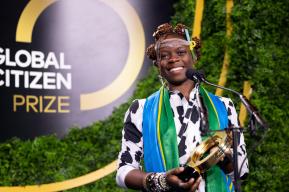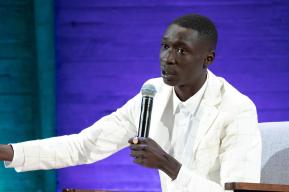This UNESCO roundtable brought together representatives from government and the world of sport, including ministers, sport organizations, athletes, and gender equality advocates and experts. Together, they explored challenges, discussed concrete ways to develop survivor-centred policies, processes and programmes, and called for increased action against gender-based violence in sport.

Violence against women and girls does not exist in a vacuum. It is rooted in structural inequalities and discrimination; it is rooted in toxic social norms; and it is rooted in harmful masculinities — harmful to women, harmful to men, and costly for all of society.
Call for action
The key messages of the convened stakeholders at the Fit for Life policy roundtable have been developed into a Call for Action.
This 10-point Call for Action builds upon the strategies and resources outlined in UNESCO and UN Women's Handbook on Tackling Violence Against Women and Girls in Sport, supported by the UN Spotlight Initiative. The Handbook equips policy-makers and practitioners with strategies and resources to tackle gender-based violence effectively.

The goal of the Call is to catalyze concrete action to tackle violence against women and girls in sport, urging stakeholders — governments, sport organizations, the media, and fans — to develop and implement policies, investments and activities which address the root causes of violence, protect and support survivors, and hold perpetrators accountable.
Among others, the Call recommends the creation of a centralized governance framework and normative instrument for safeguarding in sport, to ensure harmonized and interoperable safeguarding standards in sport across Member States.
It is time to change. Maybe this is a safeguarding convention — some kind of international collaboration that UNESCO can lead — as UNESCO is in the unique position to bridge the gaps that exist between states and sport, and to help navigate the complex landscape that sport occupies.
report experiencing a form of sexual abuse as a child in sport
during the 2020 Tokyo Olympic Games was targeted at female athletes

Women and girls play a critical role in sustainable development. Their safety, empowerment, political participation, access to education, and healthcare benefit entire communities and the economy. Gender-based violence, however, directly undermines their opportunities, their development and their human rights — including the right to safely participate in and enjoy sport.
In the world of sport, women and girls face heightened risks of violence and ineffective or inadequate prevention and response mechanisms. A staggering 21% of female athletes report experiencing a form of sexual abuse as children in sport, nearly double the rate for male athletes. Too often, these abuses go unreported — only 7% of women disclose the violence they face due to fear of stigmatization, exclusion and reprisal. While some progress has been made in safeguarding policies, significant legislative gaps remain globally.
We all have the power to change minds, one by one. We owe this to those who suffer in silence, to those who stifle their dreams, and to those who could inspire us — if only we gave them the opportunity.
Designing and implementing effective safeguarding strategies: the value of survivor voices and capacity-building
Establishing robust safeguarding strategies and policies within sports organizations and schools is crucial. Yet regulations alone are often insufficient if the capacity to implement and enforce them is lacking. At the roundtable, stakeholders discussed the importance of enforcing and strengthening these systems with a focus on the voices of survivors.
For reporting mechanisms to be effective, they must be perceived as credible and confidential, assuring survivors that their reports are taken seriously. It is crucial for sports organizations to not only remove perpetrators but also to offer substantial support for survivors.
This includes investing in training and building the capacity of all involved in sports to recognize, prevent, and respond to abuse. Implementing clear, actionable reporting processes, alongside enforcing policies and fostering a survivor-centred approach, is key to rebuilding trust and enhancing the safety of sports environments.

We see different forms of violence: verbal, psychological, physical, sexual — all perpetrated on a scale. We talk about the severe forms, like rape, and beatings, but it never starts severe. The shouting, the harassment, the joking, sexual innuendos — all of that starts mild, and if no one stops mild violence, it will eventually become severe.
We have to understand that people affected by trauma in sport must be part of the solution. Engaging these people is honouring their story, their expertise — it is fundamental. And there is no way forward if we do not address power imbalances and lack of trust.
Closing the measurement and knowledge/data gap around GBV in sport: the importance of building a knowledge base for effective policies
To develop effective policies and programmes that combat violence in sport, it is crucial to have a comprehensive understanding of the issue, backed by data and research. However, significant gaps exist in the data, knowledge, and research around gender-based violence in sport.
At the policy roundtable, decision-makers and expert researchers discussed these challenges and highlighted the need for harmonized, comprehensive data, collated across sectors.

For instance, while there is some insight into high-level elite sports, contextual data on physical education and grassroots sport is noticeably sparse. It’s critical to understand and design targeted interventions not only in elite sporting bodies, but also in grassroots sport leagues, academic institutions, and after-school programmes.
Furthermore, data must be representative. Much of the existing data landscape is predominantly Eurocentric, highlighting a need for a broader array of local and regional insights. More diverse data will enable more inclusive and intersectional policy-making.
When you base your policies on data, this allows you to be more effective, and you can have governments channel their investments in a targeted way. If that approach has worked for education, why don’t we apply it to sports?
Communicating and advocating to change mentalities: the power of positive narratives in sport
Addressing the root causes of gender-based violence and discrimination in sport requires shifting the narratives that shape our perceptions of female athletes. At the policy roundtable, speakers emphasized the importance of inclusive storytelling, equal representation and male allyship in changing mentalities and fostering behavioural change.
Ensuring inclusive and equitable representation of women in sports media and leadership positions is essential, providing young athletes with role models and fostering solidarity in traditionally male-dominated spaces. By amplifying women's voices in sport narratives and securing their presence in decision-making roles, we can challenge the status quo and pave the way for a more equitable sports culture.
Moreover, male allyship plays a critical role in changing narratives around gender equality in sports. Male athletes and other sport figures in influential positions have the unique opportunity to advocate for change, challenge harmful stereotypes and toxic masculinities, and support their female colleagues openly. By actively participating in these conversations, men can help the culture that values and respects all athletes equally.

My greatest privilege as a man is my silence. We don’t have to talk about this. I am the only one here. I don’t have to be here. Nobody here would notice if I weren’t here. And this is part of the true problem — our silence in this conversation.
The roundtable was moderated by Benny Bonsu, Director of Daily Content at Olympic Channel Services and Founder of the 3012 Leaders Foundation, with Kat Craig, Human Rights Lawyer and Founder and CEO of Athlead as Event Rapporteur.
Opening speeches were given by distinguished voices from government and sport:
- Gabriela Ramos, Assistant Director-General for Social and Human Sciences, UNESCO.
- Elisabeth Moreno, Former French Minister Delegate for Gender Equality, Diversity and Equal Opportunities.
- Bárbara Fuertes, Deputy Director of Women and Sport, High Council for Sport, Ministry of Education, Professional Training and Sports of Spain.
- Emma Oudiou, Professional Athlete and Equality Advocate.
Lisa Zimouche, Freestyle Footballer and Content Creator, was also among the opening panelists and concluded the panel with a freestyle performance.
The opening segment was followed by panel discussions on “Priority Actions for a Safer Playing Field” with:
- H.E. Lindiwe Zulu, Minister of Social Development, South Africa
- Cecilia Safaee, Founder, Futebol dá força Foundation
- Joanna Maranhão, Network Coordinator, Sport and Rights Alliance
- Lombe Mwambwa, Research Director, Global Observatory for Gender Equality and Sport
- Francine Raveney, Deputy Executive Secretary of the Enlarged Partial Agreement on Sport, Council of Europe
- Anne-Laure Bonnet, Independent Sports Journalist and TV host
- Don McPherson, Former NFL American Football Player and Author
Concluding remarks were given by:
- H.E. Ms. Yuriko Backes, Minister for Gender Equality and Diversity, Luxembourg
- H.E. Mr. Jaime Pizarro, Minister of Sport, Chile and Chairperson of UNESCO’s Intergovernmental Committee for Physical Education and Sport (CIGEPS)









